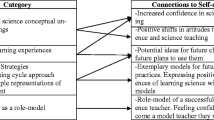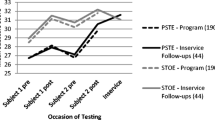Abstract
This study explores the science teaching efficacy beliefs of pr-service elementary teachers and the relationship between efficacy beliefs and multiple factors such as antecedent factors (participation in extracurricular activities and number of science and science teaching methods courses taken), conceptual understanding, classroom management beliefs and science teaching attitudes. Science education majors (n = 71) and elementary education majors (n = 262) were compared with respect to these variables. Finally, the predictors of two constructs of science teaching efficacy beliefs, personal science teaching efficacy (PSTE) and science teaching outcome expectancy (STOE), were examined by multiple linear regression analysis. According to the results, participation in extracurricular activities has a significant but low correlation with science concept knowledge, science teaching attitudes, PSTE and STOE. In addition, there is a small but significant correlation between science concept knowledge and outcome expectancy, which leads the idea that preservice elementary teachers’ conceptual understanding in science contributes to their science teaching self-efficacy. This study reveals a moderate correlation between science teaching attitudes and STOE and a high correlation between science teaching attitudes and PSTE. Additionally, although the correlation coefficient is low, the number of methodology courses was found to be one of the correlates of science teaching attitudes. Furthermore, students of both majors generally had positive self-efficacy beliefs on both the STOE and PSTE. Specifically, science education majors had higher science teaching self-efficacy than elementary education majors. Regression results showed that science teaching attitude is the major factor in predicting both PSTE and STOE for both groups.



Similar content being viewed by others
References
Ateaq, O. A. (1995). The attitudes of pre-service, male, elementary, science teachers in Riyadh Teachers College, Saudi Arabia, toward science and teaching science. Unpublished Doctoral dissertation, University of Pittsburgh, PA.
Bandura, A. (1977). Self-efficacy: toward a unifying theory of behavioral change. Psychological Review, 84, 191–215.
Bandura, A. (1997). Self-efficacy: the exercise of control. New York, NY: Freeman.
Bleicher, R.E. (2002, April). Increasing confidence in preservice elementary teachers. Paper presented at the Annual Meeting of the American Educational Research Association, New Orleans, LA.
Bleicher, R. E. (2007). Nurturing confidence in preservice elementary science teachers. Journal of Science Teacher Education, 18, 841–860.
Bleicher, R. E., & Lindgren, J. (2005). Success in science learning and preservice science teaching self-efficacy. Journal of Science Teacher Education, 16, 205–225.
Bonnstetter, R. J. (1984). Characteristics of teachers associated with an exemplary program compared with science teachers in general. Unpublished doctoral dissertation, The University of Iowa, Iowa.
Bursal, M. (2008). Changes in Turkish pre-service elementary teachers’ personal science teaching efficacy beliefs and science anxieties during a science method course. Journal of Turkish Science Education, 5(1), 99–112.
Cantrell, P., Young, S., & Morre, A. (2003). Factors affecting science teaching efficacy of preservice elementary teachers. Journal of Science Teacher Education, 14(3), 177–192.
Czerniak, C. M., & Lumpe, A. T. (1996). Relationship between teacher beliefs and science education reform. Journal of Science Teacher Education, 7, 247–266.
Emmer, E. T., & Hickman, J. (1991). Teacher efficacy in classroom management and discipline. Educational and Psychological Measurement, 51, 755–765.
Enochs, L. G., & Riggs, I. M. (1990). Further development of an elementary science teaching efficacy belief instrument: a preservice elementary scale. School Science and Mathematics, 90, 695–706.
Enochs, L. G., Scharmann, L. C., & Riggs, I. M. (1995). The relationship of pupil control to preservice elementary science teacher self-efficacy and outcome expectancy. Science Education, 79, 63–75.
Finson, K. D., & Beaver, J. B. (1994). A study of the status of science education in Illinois scientific literacy target schools, K-6. Macomb, IL: Western Illinois University.
Gabel, D. (1980). Attitudes toward science and science teaching of undergraduates according to major and number of science courses taken and the effect of two courses. School Science and Mathematics, 80, 70–76.
Gencer, A. S., & Cakiroglu, J. (2007). Turkish preservice science teachers’ efficacy beliefs regarding science teaching and their beliefs about classroom management. Teaching and Teacher Education, 23, 664–675.
Gibson, S., & Dembo, M. H. (1984). Teacher efficacy: a construct validation. Journal of Educational Psychology, 76, 569–582.
Ginns, I. S., Watters, J. J., Tulip, D. F., & Lucas, K. G. (1995). Changes in preservice elementary teachers’ sense of efficacy in teaching science. School Science and Mathematics, 95, 394–400.
Grossman, P. L., Wilson, S. M., & Shulman, L. S. (1989). Teachers of substance: subject matter knowledge for teaching. In M. C. Reynolds (Ed.), Knowledge base for the beginning teacher (pp. 23–36). Oxford, UK: Pergamon.
Gunning, A. M., & Mensah, F. M. (2011). Preservice elementary teachers’ development of self-efficacy and confidence to teach science: a case study. Journal of Science Teacher Education, 22, 171–185.
Guskey, T. R. (1988). Teacher efficacy, self-concept, and attitudes toward the implementation of instructional innovation. Teaching and Teacher Education, 4, 63–69.
Hechter, R. P. (2011). Changes in preservice elementary teachers’ personal science teaching efficacy and science teaching outcome expectancies: the influence of context. Journal of Science Teacher Education, 22, 187–202.
Henson, R. K. (2001). Relationships between preservice teachers’ self-efficacy, task analysis, and classroom management beliefs. Paper presented at the Annual Meeting of the Southwest Educational Research Association, New Orleans, LA.
Jordan, A., Kircaali-Iftar, C., & Diamond, C. T. P. (1993). Who has a problem, the student or the teacher? Differences in teacher beliefs about their work with at risk and integrated exceptional students. International Journal of Disability, Development and Education, 40, 45–62.
Laut, J. (1999). Classroom management: beliefs of pre-service teacher and classroom teachers concerning classroom management styles. Paper presented at the Fall Teachers Education Conference, Charleston, SC.
Lumpe, A. T., Haney, J. J., & Czerniak, C. M. (2000). Assessing teachers’ beliefs about their science teaching context. Journal of Research in Science Teaching, 37(3), 275–292.
Martin, N. K., Yin, Z., & Baldwin, B. (1998). Construct validation of the attitudes and beliefs on classroom control inventory. Journal of Classroom Interaction, 33, 6–15.
Palmer, D. H. (2006). Sources of self-efficacy in a science methods course for primary teacher education students. Research in Science Education, 36, 337–353.
Pigge, F. L., & Marso, R. N. (1997). Development of attitude toward teaching career in a longitudinal sample of teacher candidates progressing through preparation and five years of teaching. Paper presented at the Annual Meeting of the American Educational Research Association, Chicago, IL (March).
Ramey-Gassert, L., Shroyer, M. G., & Staver, J. R. (1996). A qualitative study of factors influencing science teaching self-efficacy of elementary level teachers. Science Education, 80(3), 283–315.
Ramsay, W., & Ransley, W. (1986). A method of analysis for determining dimensions of teaching style. Teaching and Teacher Education, 2, 69–79.
Riggs, I. M., & Enochs, L.G. (1990). Toward the development of an elementary teacher’s science teaching efficacy belief instrument. Science Education, 74, 625–637.
Sarikaya, H. (2004). Preservice elementary teachers’ science knowledge, attitude toward science teaching and their efficacy beliefs regarding science teaching. Unpublished Master’s thesis, Middle East Technical University, Ankara, Turkey.
Savran, A. (2002). Pre-service science teachers’ efficacy beliefs regarding science teaching and their classroom management beliefs. Unpublished Master’s thesis, Middle East Technical University, Ankara.
Savran, A., & Çakıroğlu, J. (2003). Differences between elementary and secondary preservice science teachers’ perceived efficacy belies and their classroom management beliefs. The Turkish Online Journal of Educational Technology—TOJET, 2(4), 15–20.
Schoon, K. J., & Boone, W. J. (1998). Self-efficacy and alternative conceptions of science of preservice elementary teachers. Science Education, 82(5), 553–568.
Settlage, J. (2000). Understanding the learning cycle: influences on abilities to embrace the approach by preservice elementary school teachers. Science Education, 84, 43–50.
Sokal, L., Smith, D. G., & Mowat, H. (2003). Alternative certification teachers’ attitudes toward classroom management. The High School Journal, 86(3), 8–16.
Stein, M. K., & Wang, M. C. (1988). Teacher development and school improvement: the process of teacher change. Teaching and Teacher Education, 4, 171–187.
Stollberg, R. (1969). Tha task before us-1962. The education of elementary school teachers in science. Reprinted by L. I. Kuslan and A. H. Stone in Readings on teaching children science. Belmont, California: Wadsworth Publishing Company.
Sünger, M. (2007). An analysis of efficacy beliefs, epistemological beliefs and attitudes towards science in preservice elementary science teachers and secondary science teachers. Unpublished Master’s thesis, Middle East Technical University, Ankara.
Tarik, T. (2000). The impact of prior science course experience and achievement on the science teaching self-efficacy of preservice elementary teachers. Journal of Elementary Science Education, 12(2), 21–31.
Tekkaya, C., Çakıroglu, J., & Özkan, Ö. (April, 2002). Turkish preservice science teachers’ understanding of science, self efficacy beliefs and attitudes toward science teaching. Paper presented at the National Association for Research in Science Teaching (NARST), New Orleans, LA.
Tekkaya, C., Cakiroglu, J., & Ozkan, O. (2004). Turkish preservice science teachers’ understanding of science, and their confidence in teaching science. Journal of Education for Teaching, 30, 57–66.
Thompson, C. L., & Shrigley, R. L. (1986). What research says: revising the science attitude scale. School Science and Mathematics, 86(4), 331–343.
Tosun, T. (2000). The impact of prior science course experience and achievement on the science teaching self-efficacy of preservice elementary teachers. Journal of Elementary Science Education, 12, 21–31.
Turkmen, L. (1999). A study of undergraduate science education major students’ attitudes towards science and science teaching at fourcpoyear teachers colleges in Turkey. Unpublished PhD dissertation, the University of Nebraska—Lincoln.
Turkmen, L. (2002). Pre-service elementary teachers’ attitudes toward science and science teaching. Hacettepe University Journal of Education, 23, 218–228.
Turkmen, L. (2007). The influences of elementary science teaching method courses on a Turkish teachers college elementary education major students’ attitudes towards science and science teaching. Journal of Baltic Science Education, 6(1), 66–77.
Wilson, J. D. & Scharmann, L. C. (1994). An evaluation of field experiences for the preparation of elementary teachers for science, mathematics and technology. Paper presented at the Annual Meeting of the National Association for Research in Science Teaching, Anaheim, CA.
Wingfield, M. E., Freeman, L., & Ramsey, J. (2000). Science teaching self-efficacy of first-year elementary teachers trained in a site based program. Paper presented at the Annual Meeting of the National Association for Research in Science Teaching, New Orleans, LA. Retrieved from ERIC database (ED 439 956).
Wolfang, C. H. (1995). Solving educational problems: Strategies for classroom teachers (3rd ed.). Boston: Allyn and Bacon.
Woolfolk, A. E., & Hoy, W. K. (1990). Prospective teachers’ sense of efficacy and beliefs about control. Journal of Educational Psychology, 82, 81–91.
Yılmaz, H., & Huyugüzel-Çavaş, P. (2008). The effect of the teaching practice on pre-service elementary teachers’ science teaching efficacy and classroom management beliefs. Eurasia Journal of Mathematics, Science & Technology Education, 4(1), 45–54.
Acknowledgement
This study is funded by Çukurova University Academic Research Projects Unit. The funded project title is Factors Affecting Science Teaching Self-efficacy Beliefs of Preservice Elementary Teachers. I hereby thank this unit for its valuable financial support.
Author information
Authors and Affiliations
Corresponding author
Appendices
Appendix
Example items from ABCC Inventory
Instructional Management Subscale
I believe the teacher should direct the students’ transition from one learning activity to another.
I believe that students need direction in how to work together.
I specify a set time for each learning activity and try to stay within my plans.
I believe class rules are important because they shape the student’s behaviour and development.
People Management Subscale
I believe students should create their own daily routines as this fosters the development of responsibility.*
I believe students will be successful in school if allowed the freedom to pursue their own interests. *
When moving from one learning activity to another, I will allow students to progress at their own rate.*
Students in my classroom are free to use any materials they wish during the learning process.*
*Scoring reversed for these items
Rights and permissions
About this article
Cite this article
Taştan Kırık, Ö. Science Teaching Efficacy of Preservice Elementary Teachers: Examination of the Multiple Factors Reported as Influential. Res Sci Educ 43, 2497–2515 (2013). https://doi.org/10.1007/s11165-013-9357-y
Published:
Issue Date:
DOI: https://doi.org/10.1007/s11165-013-9357-y




